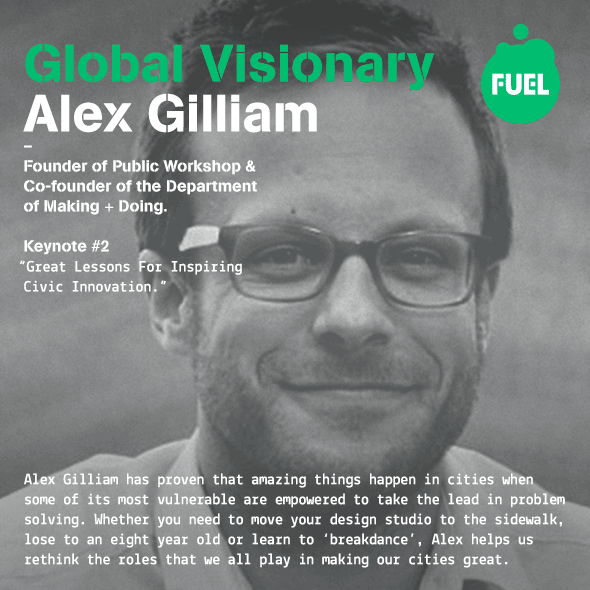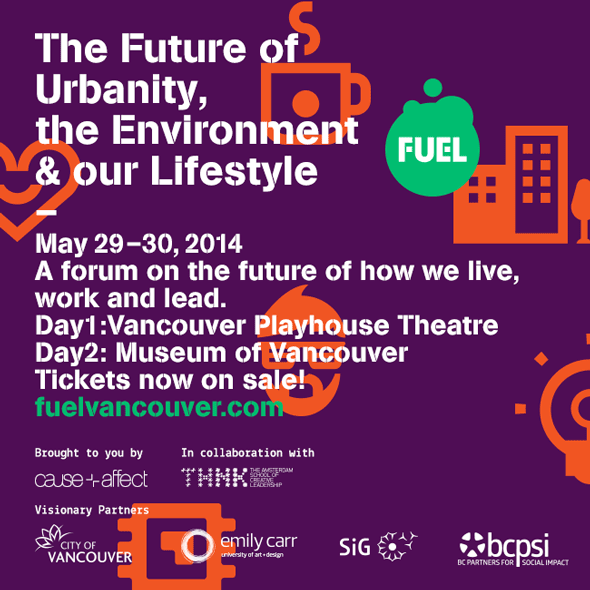Vancouver Is Awesome is a proud sponsor of FUEL – The Future of Urbanity, the Environment and our Lifestyle – a forum on the future of how we live, work and lead.
FUEL will connect innovators from around the globe with local entrepreneurs, designers, engaged citizens and leaders from public, private and nonprofit sectors committed to developing a better world. Created by Cause+Affect and produced in collaboration with THNK, the School of Creative Leadership, FUEL will explore four sectors relevant to our city; Food, Design, Sustainability and Technology.
One of the Global Visionaries that will be participating in FUEL is Alex Gilliam (Pennsylvania, USA) founder of Public Workshop and co-founder of the Department of Making + Doing. He is a designer, builder and nationally recognized design-educator.

Here’s short summary of his presentation at FUEL:
Great Lessons For Inspiring Civic Innovation
Alex Gilliam has proven that amazing things happen in neighbourhoods when some of its most vulnerable are empowered to take the lead in problem solving. Whether you need to move your design studio to the sidewalk, lose to an eight year old or learn to ‘breakdance’, Alex helps us rethink the roles that we all play in making our cities great.
Q+A’s between Jane Cox, FUEL/Cause+Affect and Robin Chase
Jane: You work a great deal with young people. Why?
Alex: I am really good at working with young people and I also enjoy it tremendously. At the same time, I believe that youth can often be levers for much larger positive social change. In fact, one of the great roles they can play is prototyping or modelling the behaviours that adults have forgotten.
Jane: Gentrification is a massive problem for many communities around the world, from Brooklyn to Vegas to Vancouver and your own city of Philadelphia. Is there such a thing as “good gentrification”, or at least benefits to the process of rejuvenation.
Alex: To be frank, I often plead ignorance on the topic. I am most frequently working at a much more granular level, helping youth take the lead in inspiration action in their communities around a particular, issue, place or need. At the core, most people--no matter their socio-economic background--just want to see positive action or movement. When it is led by youth in a community, even better.
Jane: You focus a lot on “toys” and “play” in your work. What benefits do you see working to solve what are traditionally very serious topics.
Alex: All of our work and our processes--which are frequently considered play--are simply grounded in the fundamentals of how we learn and create best. It just so happens that the roots of these methods can be found in the way we learned as babies, as children. Sure, this type of 'play' often provides ever-important levity and joy but really it's just about how we best create. In fact, it was just about a year ago that I actually started acknowledging our methods are 'play' because they are so deeply based in the fundamentals of learning and creating. I had been resisting this 'naming' for a long time.
Jane: Here in Vancouver, we are facing a conflict between an understanding of who has the “expertise” to produce authentic change. Can you give us your thoughts on how you negotiate between the “expertise of the community” and the “expertise of the outside professional”.
Alex: You have to learn how to breakdance. You need to learn how to confidently lead, be a part of the circle and be outside of the circle, simply watching. And the hardest thing is knowing when to toggle between the various positions which can occasionally be necessitated within the span of 15 minutes. To set yourself up for success, you need to visibly fail within the first 15 minutes; set up a working relationship and modes of creating that are flexible, generative and open; and you need to focus on growing a culture of greatness around your project--attentively growing a team that is ready to embrace risk, failure, success, awesomeness and duds. Routine group reflection is also an essential part of this process.
Jane: Community engagement is always challenging. Those who engage are not always the ones you want to hear from and those you need do not always engage. Do you have advice for improving the reach of engagement tactics?
Alex: You've always got to develop multiple scales of engagement to accommodate a wide variety of potential participants. This is a no-brainer. But one of the most important things you can do is simply to go where the people are and make design/learning/etc. incredibly visible. We move the community meeting, the design studio, the classroom to the sidewalk or site and do EVERYTHING there for all of these reasons. STARTING with building, making and doing from the word 'go' also creates trust, a buzz, context and action that will ultimately spur much larger engagement. We like to call all of this, 'Tactical Doing.'
FUEL Day 1 – $250 includes evening Dialogues and After-party
FUEL Day 2 – $500 includes full day Workshop by THNK
FUEL Day 1+2 – $700
Buy tickets here



